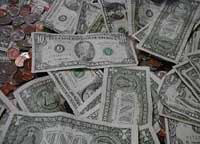Euro nominally rose against US dollar

EURO was slightly up against the U.S. dollar on Monday with traders looking ahead to key meetings of the European Central Bank and the Bank of England later this week.
The 13-nation euro currency bought US$1.4669 in morning European trading, up slightly from the US$1.4636 it bought in New York late Friday and nearly three cents off its record high of US$1.4966 set on Nov. 23.
The pound was also higher, buying US$2.0629 in afternoon trading, up from the US$2.0569 it bought Friday in New York.
The euro and the pound have been rising against the dollar and other currencies. The mortgage problems in the U.S. that have tripped up borrowers and caused a credit crisis among banks are stoking fears about the health of the U.S. economy.
Concerns over the huge U.S. trade deficit, which leaves more dollars in the hands of foreigners, have also weighed on the dollar.
Monday's slight gains came as the ECB and Bank of England prepare to discuss whether their own interest rates should remain steady or be adjusted higher or lower in separate meetings on Thursday. The current rates are 4 percent and 5.75 percent, respectively.
The meetings come amid renewed fears that the U.S. subprime crisis could spread further globally and debate over whether rate cuts could help stem such concerns.
"Speculation over interest rate policy will rather inevitably end up dominating the agenda for currency market traders over the next couple of weeks," same James Hughes, an analyst at CMC Markets in London.
"There's been no shortage of debate over how the respective central banks may end up acting and essentially as each piece of data is now released, traders will be factoring this in to whether rate cuts will be forthcoming before the year end," he said.
Lower interest rates can jump-start an economy, but they can also weaken a currency as investors transfer funds to countries where they can earn higher returns.
The rising euro has also caused some companies to take a serious look at locating manufacturing plants outside of the 13 countries that use the euro.
EADS Chief Executive Louis Gallois, in an interview with France's Europe-1 radio, said that shifting production outside the euro zone's borders because of dollar weakness was "no longer a taboo and risks becoming a necessity if we are to continue to survive."
He decried the "political dimension" of the dollar problem.
"The profound crisis in a number of industries" is "due solely to the fact that the Americans have a policy that translates as a never-ending fall of the dollar." Gallois urged Europe's leaders to express themselves "with force and unity."
In other trading, the dollar was lower against the Japanese yen, slipping to 110.32 yen from 111.15 yen on Late Friday in New York.
Subscribe to Pravda.Ru Telegram channel, Facebook, RSS!


